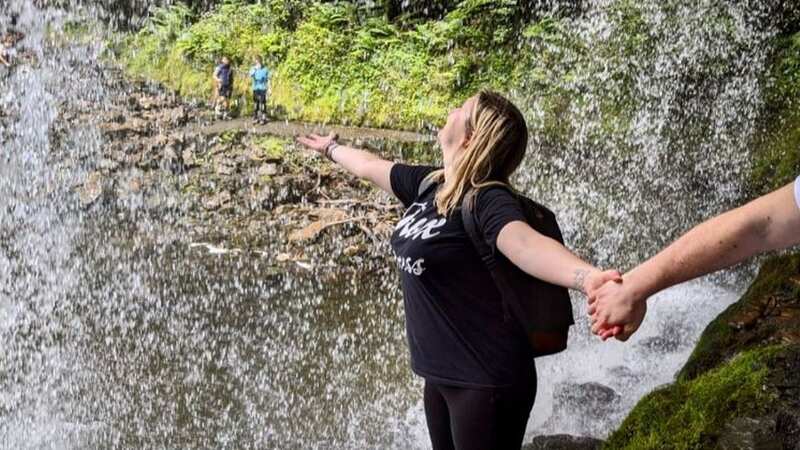£250k claim 'disabled' car crash victim caught hiking and dancing at wedding

A woman who claimed to be disabled from a car crash was caught on a "strenuous" four-hour waterfall hike and dancing at a music festival.
Claire Thomas, 39, tried to claim more than £250,000 after the 2016 crash, saying the suffered soft tissue injuries to her neck, back, and shoulders as well as migraines and psychological problems.
In the years that followed, she was caught dancing at a wedding, attending a pop concert and jetting off on trips to Italy and Switzerland.
Ms Thomas, who had trained as a lawyer and worked as a judge's clerk, was said to have been "fundamentally dishonest" about the scale of her injuries from the crash.
Despite her claiming that her injuries disabled her and limited her capacity to walk, medical experts found there was no reason for this to be the case, reports Wales Online.
 Woman tells of losing 29 kilos and becoming a bodybuilder in her 60s
Woman tells of losing 29 kilos and becoming a bodybuilder in her 60s
Ms Thomas, from Merthyr Tydfil in Wales, had been placed under surveillance after insurance company LV=, whose policyholder was involved in the 2016 crash, became suspicious of her symptoms.
 Ms Thomas went to see P!nk perform at the Principality Stadium among other activities (WalesOnline/Rob Browne)
Ms Thomas went to see P!nk perform at the Principality Stadium among other activities (WalesOnline/Rob Browne)A surveillance operation carried out by law firm Clyde & Co captured evidence of her walking, jogging, and playing with her nephew in the park.
While a review of her social media found evidence of her trips abroad as well as her walking along "very rough" and "slippery" paths while undertaking the famous Four Waterfalls Walk in the Brecon Beacons.
The case was subject to a hearing at Cardiff County Court with a judge dismissing Ms Thomas' claim after finding that she had "not presented a truthful account of her symptoms".
Insurer LV= is now looking to recover costs from Ms Thomas.
The court heard that in July 2016, Ms Thomas, who had recently left her job in London and was moving back to south Wales, was driving her Vauxhall Astra along the A465 Heads of the Valleys Road from Merthyr towards Aberdare.
As she hit traffic, a van driven by Alan Owen failed to stop and collided with the back of her car.
Ms Thomas' vehicle suffered "relatively significant" damage and was considered an insurance write-off while Mr Owen admitted liability for the crash.
Three years later in July 2019, Ms Thomas issued proceedings with the list of injuries.
She also claimed that she had developed a "secondary fibromyalgia syndrome with hemiplegic migraine" as well as psychological consequences.
 Chelsea winners and losers from record transfer window as more changes to come
Chelsea winners and losers from record transfer window as more changes to come
This included flashbacks, travel anxiety, and low mood with her symptoms allegedly disabling her "in terms of mobility, pain, and all aspects of daily living" albeit with "good days and bad".
 Investigators found that Ms Thomas had fraudulently exaggerated her symptoms (Clyde & Co)
Investigators found that Ms Thomas had fraudulently exaggerated her symptoms (Clyde & Co)Her initial claim was supported by medical reports from a consultant orthopaedic surgeon and a consultant neurologist and sought "significant" damages.
These included a past loss of earnings between the time of the accident and March 2022, when the most recent iteration of her claim was issued, of £124,444.86 and a future loss of earnings of £60,900.
While the combined total of her estimated past and future care and assistance costs was calculated at £25,137.
However despite extensive investigation by medical experts none could suggest a physical cause for her disability save for a period of months after the crash.
With no proven physical explanation, Ms Thomas contended that the trauma of the collision had "aggravated a pre-existing somatic symptom disorder (SSD)" which occurs when someone has extreme exaggerated anxiety about physical symptoms which prevents them from carrying out everyday activities.
A psychiatry expert accepted that this was the most likely explanation if Ms Thomas' account was reliable.
 Ms Thomas wrote "Today I pay the price but yesterday was worth it" posting photos of a waterfall walk online (WalesOnline)
Ms Thomas wrote "Today I pay the price but yesterday was worth it" posting photos of a waterfall walk online (WalesOnline)But they also suggested she could have a factitious disorder which involves a conscious over-reporting of symptoms albeit with an unclear motive for being misleading.
The defendant, Mr Owen, argued that this was the case and that the court should find that Ms Thomas had been "fundamentally dishonest" in her reporting of her symptoms.
The court heard that following the crash, Ms Thomas sought benefits and during an interview with the Department of Work and Pensions in July 2017 said that she used a crutch while outdoors and would go "nowhere else...by herself" other than the shop across the road from her home.
She also said that she could not walk great distances and was nervous of public transport.
However just two months later, a social media post by Ms Thomas showed a picture of her dancing at a wedding in London with the caption "this may explain the unbelievable amount of pain I'm in today" followed by the 'see-no-evil' and 'crying with laughter' emojis.
By early 2018, Clyde & Co had launched their investigation and surveillance operation with Ms Thomas captured walking "apparently normally" for around two kilometres on two separate occasions.
Footage was also captured of her looking after her young nephew, taking him to the park and pushing him on the swings.
It showed her "[break] into a short jog" which she explained was due to her nephew needing to use the toilet, while she was also seen climbing a set of stairs without using the handrail and lifting the boy in and out of a swing, "bending down and seemingly without restriction".
In spoken evidence, Ms Thomas explained that she was in pain but chose to "suffer afterwards" as she wanted to spend time with her nephew.
She also claimed that her symptoms were "not black and white" and that "no-one gets it" when it comes to chronic illness.
Ms Thomas went on a number of trips throughout 2018, visiting Copenhagen in March before attending a family reunion in Preston the following month.
In August, she travelled to Scotland by car and then went to Switzerland for her 35th birthday in October with a social media post made during that trip reading "life is just one big adventure."
But she added that she was "a little out of sorts and a tad disoriented".
These trips came either side of a further assessment from the DWP in June 2018, which found that she had "variable" function and roughly "half good days and half bad days" a week.
"On good days she can manage her stairs, shower, and dress and walk two minutes to go shopping and then lean on a trolley for a short while to get items," it read.
"However she has a nap in the afternoon due to fatigue."
It later added: "On bad days she will barely be able to get around the house due to her pain, fatigue, and paralysis on one side of her body... she will spend most of her time in bed and barely be able to sit at all".
The surveillance continued throughout 2019 with footage recorded on February 1 capturing her going up snow-covered stairs without using a handrail.
In spoken evidence, Ms Thomas claimed that this was because this was one of her good days and she "did not want to get snow or ice on her hand".
Around a week later she went to Italy with her niece, travelling to Venice and then onto Rome for the Six Nations match between Italy and Wales.
In a social media post at the time she said she "had a wonderful weekend... making some great memories," but was now in "indescribable" pain.
Later that month, she also went to O'Neills pub in Cardiff to watch the Wales v England rugby match.
A month before she issued proceedings, in June 2019, Ms Thomas also attended a P!nk concert at the Principality Stadium while in August she worked at Leeds Music Festival with her friend Laura Sutton.
While Ms Thomas had different accommodation to camping Ms Sutton provided evidence to the court that "in general terms" suggested she managed to get around the event.
By 2020 Ms Thomas revealed that she had fallen out with her sister and her brother since the crash as they "find it difficult to understand how she has become disabled" from it with both siblings allegedly refusing to help her and her sister accusing Ms Thomas of faking her symptoms.
She also told a psychiatry expert that she "prefers to avoid noisy places" and had worn ear defenders at the music festival and had other special arrangements made in order for her to attend.
Further assessments in June and July that year saw her walking ability judged to be "a maximum of 100 yards on a good day," with Ms Thomas "walk[ing] slowly" and "usually [having] to stop and rest due to fatigue and pain after walking for about two minutes".
That second assessment came just over two weeks after her Strava exercise app recorded her completing a 1.89-mile and 1.43-mile walk to a local park on consecutive days with these taking 40 minutes and 31 minutes respectively.
On the same day as another consultation with an orthopaedic expert, in which it was ascertained that she would "use a rail [on stairs] if one is available," surveillance footage caught her using a flight of stairs at an outdoor café without using the handrail.
Ms Thomas gave her first statement in proceedings in July 2020, when she claimed she had "not experienced a pain-free day" since the crash four years earlier.
She described physical movement as something "where the more I do the worse I seem to suffer" while she also claimed that on a bad day she was "unlikely to move much further than my bed or sofa".
She added: "Living with a chronic illness is kind of like constantly living in lockdown. I have already missed events, friends' weddings, parties, or just going out due to my chronic illness. However I do what I can and try to adapt and live the best and fullest life I can".
Less than two weeks after providing that statement, Ms Thomas created another social media post that showed she had completed the Four Waterfalls Walk in the Brecon Beacons as she wrote: "Today I pay the price. But yesterday was worth it. Walking behind the waterfalls," with a series of photos illustrating the walk itself.
The route, which was agreed upon by Ms Thomas, Ms Sutton, and her partner, is described as 'hard', roughly five and a half miles in distance, and taking an estimated three to four hours to complete. About half of the way along the route, the court heard, there is an optional route that leads down to the Sgwd y Eira falls.
This detour, as signposted on a map at the start of the pathway, is described as "strenuous", around 300m in length each way and a change in height of around 330ft. The trail was also described as "a steep, zig-zag path," with the path behind the waterfall "rough, slippery, and [with] a low-roofed section".
Ms Thomas accepted that she chose to take on the optional strenuous detour before completing the rest of the walk and said she walked slowly and rested when she needed to. In her evidence Ms Sutton said that while she knew her friend could not walk as far as she could her knowledge of her from Leeds Festival made her believe that she could manage the waterfall walk.
The claimant also later explained that it was a one-off event and she had tried to push herself to complete the walk, arguing that it should not be regarded as being reflective of her true level of mobility.
Five pairs of expert medical witnesses were involved in the case with a "large measure of agreement" between them that there was no organic physical or psychiatric explanation for the symptoms.
While a psychiatric expert was initially willing to accept an SSD diagnosis, he later raised the issue of Ms Thomas' reliability and concluded it was a matter for the court to decide.
Dismissing Ms Thomas' claim Judge Robert Harrison said he had reached his decision "with a heavy heart" but concluded that she had been fundamentally dishonest with this dishonesty going "to the heart of the claim".
He said: "I am driven to the conclusion that the defendants have established on the balance of probability that the claims had not presented a truthful account of her symptoms, to the medical experts in this case, and to those whom she reported the extent of the same following the accident.
Read more similar news:
Comments:
comments powered by Disqus

































